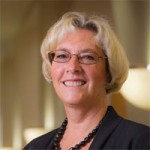This article is more than 5 years old.
Change, serendipity…that’s what ALA is all about. Choosing from the dozens of programs available, I finally decided to go hear Khaled Hosseini, author of the The Kite Runner (required reading for all Americans) and the new A Thousand Splendid Suns at the Convention Center.After standing in line for about 10 minutes, word spread through the line that Hosseini had canceled and Patricia Cornwell was taking his place. Aargh, so half the line evaporated to go onto their second choice. For me, that meant that I could get to my ACRL/ULS/Communications Committee meeting on time, instead of late. On the way, I ran into my colleague, Jeff Trzeciak, who used to work with me at Wayne and is now the University Librarian at McMaster University in Canada, and also served as our Digital Forsyth consultant a couple of years ago. The Committee meeting itself was pretty dry, as the outgoing members (like me) were anxious to pass off business to the enthusiastic new members. Ironically, they talked about discontinuing their traditional newsletter in favor of a blog (sound familiar to GAZ followers?)
In the afternoon, I attended Janice Simmons-Welburn‘s ACRL/ULS President’s Program on “Leadership or Management: Which is it?” Janice is a colleague from ULG as Dean of Libraries at Marquette University. Panelists included Dr. Julie Todaro from Austin Community College, Karen Williams from the University of Minnesota and Adam Benitez, an absolutely charming recent library school graduate who was President of the Library Support Staff Association. This was an interesting topic to me, as a graduate of a Education Leadership and Policy Studies program who wants to believe I have grown up from being a manager into a leader. Julie Todaro, who is also ACRL President-Elect gave a very useful discussion of how both sets of skills are needed in an organization, though not necessarily in the same person.
My last session of the day was “The Google Five Libraries: Two Years, Six Months and Seven Days in the Life of the Google Library Project. (I got there early so I got a seat by an outlet, just ahead of the view in Susan’s blog picture) I am one of those librarians who believe the world changed on December 14, 2004 when Google announced its original library project. I received a message at 12:51 am from one of my former colleagues Wayne State, then living in California, who read it on the New York Times website. The fact that my alma mater, The University of Michigan, was one of the five libraries and the only one with the goal of digitizing the entire library collection of 7 million volumes filled me with great pride. I remembered a three margarita lunch I had had in the summer of 2003 with the collection development officer at UM, who said he wished he could tell me about a project Google was talking about but if he did, he would have to kill me!
The goal of the Google Book Search project is to make it as easy to search content of books as it is to search web pages. The content may currently be divided into three categories:
- Out-of-copyright books – full text available
- Publisher partner books – up to 20% of the book viewable as a preview to purchase
- In-copyright books – only a “snippet” of text available
The participants talked about the progress of the original five libraries (Michigan, Harvard, Stanford, Oxford, New York Public Library) in their mass digitization efforts. Though none would say exactly how many volumes had been digitized, responses ranged from the “thousands” at Oxford University to just short of 2.5 million at Michigan. All participants said Google had been an ultra-cooperative partner, gaining new respect for bibliographic complexities and being sensitive to preservation issues. As the information inside digitized books becomes discoverable to the world through Google, all libraries are fielding more reference and interlibrary loan requests for them (even though they were theoretically available through the library catalog for decades).
 To end the night, I went with the Alibris crowd (from left, Renee, Shelley, Jack, Mary Lou, and Bill) to the Spectrum Scholarship bash to see Mark Russell and the Capital Steps. They were hilarious, as usual, especially if you were a “radical, militant librarian” as was most of the crowd. I had seen virtually the same show, with a few names changed in 1980 when I came to Washington for the Medical Library Association conference. Still funny. On the way home, Bill left his cell phone in the cab but the cabbie kindly answered it when he called and brought it back to our hotel 30 minutes later. Whew!
To end the night, I went with the Alibris crowd (from left, Renee, Shelley, Jack, Mary Lou, and Bill) to the Spectrum Scholarship bash to see Mark Russell and the Capital Steps. They were hilarious, as usual, especially if you were a “radical, militant librarian” as was most of the crowd. I had seen virtually the same show, with a few names changed in 1980 when I came to Washington for the Medical Library Association conference. Still funny. On the way home, Bill left his cell phone in the cab but the cabbie kindly answered it when he called and brought it back to our hotel 30 minutes later. Whew!
